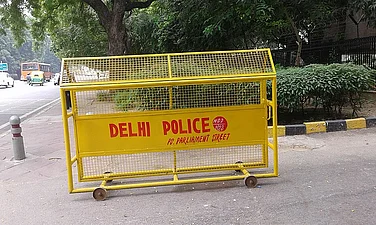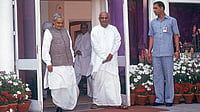In a candid talk with Outlook, former ISRO chairman G. Madhavan Nair offers fresh insight on the controversial Antrix-Devas deal and speaks with enormous hurt of the order banning him and three other scientists from holding government positions. Excerpts from an interview with Sugata Srinivasaraju:
There’s some talk that the ban may be reviewed?
Any amount of talk of this kind is not going to make us happy. On an issue that is non-existent, a punitive action of this kind is never heard of—that too without a chargesheet and a formal inquiry.
It is said some of your own colleagues prompted this action?
Basically, what I don’t understand is that I handed over chairmanship of ISRO to Dr K. Radhakrishnan on November 1, 2009, and within a month, a wholesale inquiry was ordered into a contract that was about to be completed. The Devas agreement was there for two years. The satellite was also ready, and within a few months we would have gone for a launch. Radhakrishnan was a member of the Space Commission and the Antrix board and was fully aware of what was happening. But I don’t know what happened within one month.
Naturally. He was the boss and he appointed the B.N. Suresh committee. And even before the committee gave its report, I am told, a note was sent to the PMO saying the Devas contract should be annulled. The Suresh committee actually gave a positive recommendation. It has been a standard practice that, whenever we go for satellite approval to the government, we do not name the private parties who’ll be allotted the capacity. Because there may be changes later. Even in case of DTH operators like Sun TV or Tata Sky, we did not name them in the cabinet note. But this was highlighted as a big anomaly. We were accused of keeping information away from the government.
The Suresh committee report isn’t in the public domain. Have you seen it?
I have seen it unofficially. It is a very clean report. They have concluded that the technology is beneficial for the country and whatever we have done is as per established norms. Nothing needs to be revisited. The report also says how we deploy this particular frequency and band is a broader issue, an issue that has to be reviewed in the national perspective.
The fact that there was no competitive bidding has been highlighted....
The satellite policy formulated in 2000 wanted to liberalise the use of satellite for private operations. It said, if any private operator comes to ISRO, the organisation should strive to provide capacity, and in case it does not have the capacity, it should hire to provide it. We adopted the first-come-first-served policy. The pricing was fixed in such a way that the government did not make a loss. We made sure that at least 10 to 15 per cent return on investment was obtained. Pricing of transponders can’t be arbitrary, because there are competitive pressures from international operators. International pricing for the transponders in question varies anywhere from $1 million to $1.5 million per year. Our price has been between $0.9 million and $1.2 million.
S-band is a very important resource. We do not have L-band, which others are using. The nearest available is only S-band. It is a very vital technology and the country has missed the opportunity to commission such a system. In the debate, there has been a mix-up between satellite capacity and spectrum. ISRO gives the authority only to use the satellite transponder. It was for Devas to go to the department of telecommunications to get necessary spectrum clearances for operation by paying the requisite fee. Devas would have done so at an appropriate time. ISRO has never dealt with spectrum sale so far.
Devas was formed by former ISRO officials. Did that raise suspicion?
Around 2000, the government made a policy decision. It said space technology is not catching up and therefore any ISRO employee can be allowed to go out and start space-based industries. Technology would be given to those people at a subsidised cost. The Devas people were entrepreneurial. They went abroad and put the technology together. There was nothing unusual about it.
CAG has pointed out huge losses in the Devas deal....
I have one counter. ISRO’s budget is Rs 4,000 crore per year. With two transponders if I can get Rs 2 lakh crore, not only can I run ISRO, but I can run all the space programmes in the world. Today, foreign satellite companies are struggling to get a single digit return on investment. Profit margin is only 5-6 per cent. We got around 12-15 per cent return on investment. If you take the price of the costliest apple and then apply it to a lime, this is what you get.
As long as I was head of ISRO, I had a perfect, cordial relationship not only with the PMO, but with the prime minister himself. I have gone to him when the life of Chandrayan had to be terminated. I have gone to him when there was a gslv failure. I have gone to him when Antrix crossed around Rs 1,000 crore business and handed over a Rs 30 crore dividend to the government. He always reacted positively.
It is being made out that the current ISRO chairman, Dr Radhakrishnan, has a personal agenda against you?
That comes out of this whole episode. Or else, where was the need to constitute an inquiry into a contract which was running smoothly? Either he himself does not like the contract or there are some other people who do not like the contract.
Have you spoken to Dr Radhakrishnan after you learnt of the ban?
I don’t want to get personal, but civility demands that if an order is issued, he must come and tell me.
Is this all because of your success with the moon mission?
One curse on the entire scientific community is professional jealousy. This is unfortunate. Yes, the moon mission happened when I was at the helm of ISRO. It was brilliant team work. I was happy that I could lead such a fine team and a fine organisation.
Nothing in ISRO has changed—except for the leadership.
If all was fine, why is it that you think you are being targeted?
I don’t know if it’s a deliberate attempt on the part of some people. I have done no wrong. If somebody can prove me otherwise, I am prepared to accept any punishment.
Both you and the current ISRO chairman are from Kerala? Is it a fight between two local boys?
In Kerala you have both coconut and arecanut. I don’t want to say anything more.
Do you think your successor has not been able to shine professionally the way you shone?
Actually, if you are a good leader, you will convert even a failure into real gold. You will dig into the reason for the failure, drive the organisation mad and get to the root cause of the problem.
Have you had any problem with the present chairman in the past?
Even if I am an excellent guy today, there is no guarantee that I’ll continue like that forever. I feel I am highly specialised in rocket technology, but when it came to human psychology, I failed.
Is the scientific community with you?
Yes. The who’s who of the scientific community has been very vocal.
Except your two illustrious predecessors, U.R. Rao and Kasturirangan?
They may also react. I am not well-versed in mind-reading to be able tell you why they haven’t so far.


























